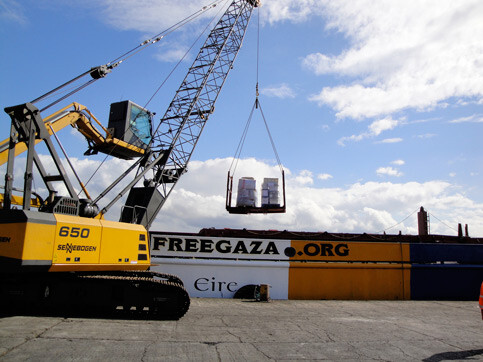The Electronic Intifada 17 May 2010

The MV Rachel Corrie will carry tons of cement and other materials to Gaza. (Free Gaza)
Later this month, ships from all over the world will converge in the Mediterranean and set sail for the occupied and besieged Gaza Strip. This international coalition is called the Freedom Flotilla.
The Free Gaza Movement has sailed eight missions to Gaza in the past three years, five of them successful. The last three were violently stopped by the Israeli Navy; the boat Dignity was rammed three times and the Spirit of Humanity turned back in January 2009, then seized and all aboard arrested.
This time the Freedom Flotilla is upping the ante and instead of one- and two-vessel challenges, will be breaking Israel’s siege with an eight-boat front.
In the past, the Israel Navy could pick us off as individual boats. Now, including Free Gaza’s four ships, 700 passengers and some 5,000 tons of reconstruction materials and medical equipment. This includes Free Gaza’s MV Rachel Corrie, which was purchased through generous donations from Malaysia’s Perdana Global Peace Foundation.
The Israeli government has responded to the “sea intifada” coming its way with saber rattling and accusations of serving Hamas. Israel has proscribed the Turkish human rights and relief group Insani Vardim Vakafi (IHH). IHH is responsible for sending a cargo ship and passenger ship in the Freedom Flotilla. Israel has accused it and Free Gaza of “supporting terrorism.” Half the Israeli navy is set to challenge the mission, with Israeli Defense Minister Ehud Barak at the helm commanding the operation in person. The air force is on standby and “diplomatic pressure” is being applied behind the scenes. The message is clear from Israel: “We will stop you and we will use force to stop you.”
At no point does the Freedom Flotilla enter Israeli territorial waters. The journey starts in local European or Turkish waters, courses through international waters and ends in Gaza’s territorial waters. No checkpoints interrupt us. No walls daunt our sight. We’ve proven that it’s possible to sail a clear line with no borders, as we want the world to be, until we get to Gaza.
Free Gaza is best described as a tactic but in practice, a tactic within a score of tactics active in the global solidarity movement. But it is an expensive one — and many have criticized the hundreds of thousands of dollars that have been spent on the missions for boats and finding boats, flagging, registration, legal costs, management costs, port fees, crew pay, mooring fees, repairs, renovation, GPS, warehouses for cargo, crane and forklift hire. Collectively the cost of the Flotilla runs literally into the millions of euros. Some ask: “Isn’t that money better spent on ‘aid’?”
Every Palestinian family we met in Gaza, particularly after Israel’s invasion last winter kept saying to us: “We don’t want aid, we need a political solution; we need our rights. Our issue cannot be reduced or swapped into bags of flour or food parcels. Palestine is not a humanitarian issue — it is a political one.” This reality, of the need for justice, tests the aid industry in Palestine, and the false “objectivity” and lack of political will in the face of human suffering with the claim: “We don’t take sides. We want to continue to keep giving our humanitarian aid.”
Well, we do take sides — that of direct democracy over occupation and apartheid.
This flotilla is an interruption to a discourse of power that says — governments know best, leave it to us to negotiate new “freedoms” and realities; a continuation of not even top-down but top-to-top processes of keeping power out of the hands of ordinary people. Leaders fly from continent to continent, round table discussions go round and round, elephants in the room stamp their feet and roar ignored. This flotilla puts that power back into our hands — to interrupt this ongoing Nakba.
We will not stop. From 1948 until now, history keeps repeating itself, colonies keep expanding, corporations keep reaping the rewards of reproducing repression; daily dispossession and casual killing is normalized, and alienation from the consequences of our work and actions keeps us compartmentalized. The occupation is reproduced on a daily basis in factories, classrooms, courtrooms, cinemas, art galleries, supermarkets and holiday resorts. Radical refusal, radical transgressions can make change happen. Refusing to be alienated from our brothers and sisters and recognizing our community is the essence of solidarity.
This flotilla represents radical solidarity and a force that can be realized when people from all over the world act on their conscience. It’s a force made real through stepping out onto the streets or into occupation-supporting businesses, through speaking out, through fundraising in mosques, churches, synagogues, schools; through writing, singing, sharing, relaying and promoting, and packing and driving boxes of materials and cement, and cheering on and praying for and protesting any attack.
Israel may well succeed in stopping us — but this is an unknown and here is power in that. We can affect that which hasn’t happened yet.
When Rachel Corrie stood in front of the bulldozer driver that killed her, she acted on radical trust — that the soldier would see her humanity. She lost, because the soldier had lost his humanity. Yet Rachel’s faith abides in each of us. Because if our oppressors are losing their humanity then we must never stop showing them that we have it. We are undertaking this mission in the spirit of those who have fought and sacrificed their lives for our collective humanity, and to remind everyone who can see of the need to act on it.
Ewa Jasiewicz is a coordinator with the Free Gaza Movement (http://www.freegaza.org/).





